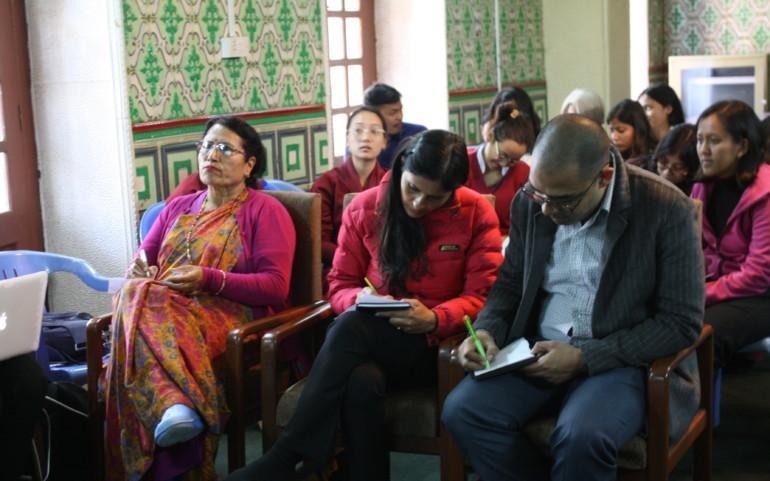Creating sustainable and long-lasting development globally through long-term partnerships

Since 2019 Diak has been coordinating the DVINE project which aims to develop holistic tools for competence-based curricula through promoting dignity, improving physical learning environments, and enhancing pedagogical competence of partners in Nepal and Vietnam. The DVINE consortium includes 7 educational institutions from Finland, Norway, Turkey, Nepal, and Vietnam: among them as a Nepalese partner the Lalitpur Nursing Campus (LNC) of Patan Academy of Health Sciences (PAHS).
Holistic approaches
At the LNC the realization of the DVINE project’s goals has taken shape in a holistic way, from structural to implementational levels. The DVINE project has provided the LNC essential supplies to ensure the capability to implement newest teaching techniques and resources developed during the project.
DVINE has also provided trainings, workshops and other insight over how to implement its objectives and competencies to the LNC’s pre-existing curriculum. Furthermore, through the DVINE project the LNC has been able to further strengthen its global network.
– We have very much benefitted from our cooperation with Diak and other partners. We have been able to connect with different institutions from around the world and our students have been granted chances to develop their skills in partner countries. This is also important to us as when they come back to Nepal, they can bring that knowledge with them and implement it in their workplace, Professor Sarala K.C. elaborates.
Power in partnerships
Professor Sarala K.C. is the Dean of the School of Nursing and Midwifery (SoNaM) of the LNC, with 32 years of experience working extensively in her field.
Professor Sarala has worked for over a decade in cooperation with Diak, starting with the HOPE (Holistic Partnership in Social Work and Health Care Education) project between 2007 and 2015. This long-term participation has given her a front row seat to observe the effects project partnerships have had on PAHS and its staff’s overall competence.
– Alike other staff members, thanks to the projects I have gained a lot of practical skills and knowledge. I have also been able to partake in personal exchange on a global scale with other professionals of the field, Professor Sarala says.
During the project periods the academy has had an impressive trajectory of consistent growth, and the students and staff have also gotten various mobility opportunities from exchange programs to work mobility projects and bilateral institution-visits to support this development.
As a result, PAHS has developed immensely in its curriculum, international network, pedagogical competence and students’ professional competence. Within this development, cooperation and partner support has played an immense role.
Wishing for a common future path
Currently the LNC is focusing on implementing the newest improvements developed during the project’s time, but what about after the DVINE project? When asked about her thought on the future of PAHS, Professor Sarala’s core message is clear: continuing holistic cooperation with Diak and other partners would be highly appreciated in the future as well.
While more immediate gains like supplies, enhanced teaching and learning techniques and updated curriculum have had a major impact, to ensure future development, establishing a position and getting to partake in a committed global partner network was seen as a key aspect for the LNC’s future growth.
– The faculty and teachers have unanimously been happy with the developments gained through not just the DVINE, but previous projects. Likewise, we have also had a good opportunity to exchange our culture, knowledge and experiences, Professor Sarala notes of the two-way effect of the partnership.
As for Diak, in an ever-globalizing educational scene some of the most valuable gains from partnerships with institutions such as PAHS can come in the form of gaining alternative ways of knowledge and cultural understanding.
At the same time, Diak will be able to carry out one of its core values of promoting sustainable living and wellbeing both locally and internationally, or more simply: “to do good for everyone in the world”.
More information on the DVINE project
- Project Manager Ari Nieminen, Diak, tel. +358 40 484 5625, ari.nieminen@diak.fi
- Project website dvineproject.com and on social media @dvineproject
Picture: Professor Sarala K.C. (leftmost seat) and colleagues during a workshop at the LNC, Nepal. Courtesy of Ulla Niittyinperä
